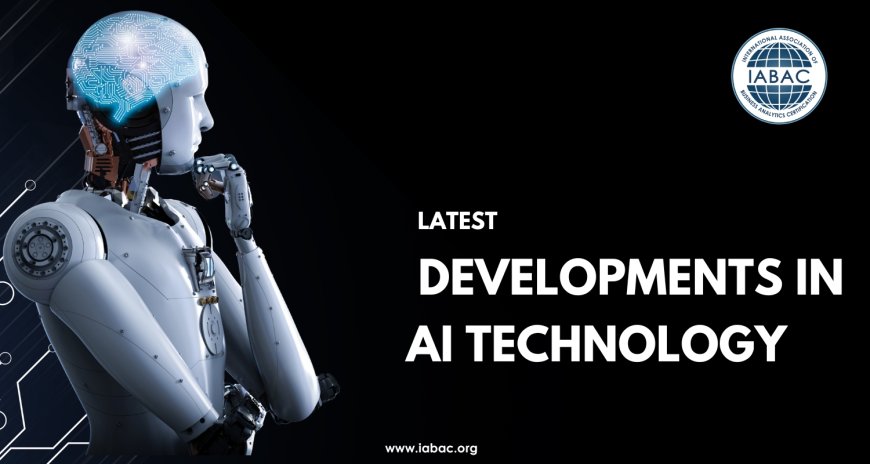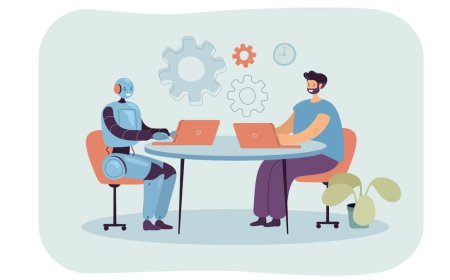Latest Developments in AI Technology
Explore the latest in AI technology with breakthroughs in machine learning, natural language processing, and robotics, changing industries and everyday life.

Artificial intelligence (AI) technology is evolving rapidly, transforming industries and daily life. AI is being integrated into healthcare for diagnostics and personalized treatment, finance for fraud detection and automated trading, manufacturing for quality control and automation, and retail for inventory management and personalized customer experiences. In daily life, AI powers virtual assistants, recommendation systems, and smart home devices. Continuous advancements in AI research and development, such as machine learning and natural language processing improvements, enable more efficient and innovative applications. As AI continues to grow, it is reshaping how businesses operate and how people interact with technology, making processes more efficient and decision-making more data-driven. This steady progress highlights AI's significant role in driving technological change and enhancing various aspects of our lives and work environments.
What are the recent developments in AI technology?
Recent developments in AI technology are driving significant changes across various fields. These advancements are making AI more capable and versatile, impacting everything from healthcare to daily consumer interactions. Here are some key areas of progress:
-
Natural Language Processing (NLP): AI systems are improving understanding and generating human language, enhancing applications like chatbots and virtual assistants.
-
Computer Vision: Advances allow AI to better interpret and understand visual information, boosting capabilities in image recognition and autonomous driving.
-
Machine Learning Algorithms: New algorithms increase the accuracy and efficiency of AI in analyzing data and making predictions.
-
Edge AI: AI processing is moving closer to where data is generated, such as on smartphones and other devices, improving speed and reducing the need for data transfer to centralized servers.
-
AI in Healthcare: AI is being used for disease diagnosis, treatment planning, and drug discovery, improving patient outcomes.
-
Robotics: AI advancements are enhancing robots' capabilities in manufacturing, service industries, and households.
-
Ethical AI: There is a growing focus on making AI systems fair, transparent, and accountable to address concerns about bias and privacy.
Impact of AI Technology on Society and Industries
AI technology impacts society and various industries in numerous ways:
-
Healthcare: AI enhances disease diagnosis, treatment planning, and drug discovery, leading to better patient outcomes and more efficient healthcare services.
-
Finance: AI improves fraud detection, risk management, and automated trading, making financial services more secure and efficient.
-
Manufacturing: AI optimizes production processes, improves quality control, and increases automation, resulting in higher productivity and reduced costs.
-
Retail: AI personalizes customer experiences, optimizes inventory management, and enhances supply chain efficiency.
-
Education: AI provides personalized learning experiences, automates administrative tasks, and supports data-driven decision-making in education.
-
Transportation: AI powers autonomous vehicles, optimizes traffic management, and improves logistics and supply chain operations.
-
Entertainment: AI enhances content recommendation systems, supports content creation, and personalizes user experiences.
-
Workforce: AI automates routine tasks, augments human capabilities, and creates new job opportunities while also requiring reskilling and adaptation.
Key Features and Innovations in AI Technology
The latest AI technology includes several important features and innovations:
-
Improved Accuracy: New machine learning models and algorithms help AI systems make more accurate predictions and decisions by processing large amounts of data more precisely.
-
Scalability: Modern AI can handle growing amounts of data and more complex tasks. Cloud computing and distributed systems allow AI to expand as needed, managing large datasets and real-time analysis effectively.
-
Interpretability: Recent developments focus on making AI decisions easier to understand. Techniques like explainable AI (XAI) help users see how AI models make decisions, which is important for trust in fields like healthcare and finance.
-
Efficiency: AI technology is becoming more efficient in terms of computational power and energy use. Optimization algorithms and specialized hardware, like GPUs and TPUs, speed up processing and reduce resources needed for AI models.
These features and innovations make AI technology more accurate, scalable, understandable, and efficient, enhancing its use in various industries and applications.
The Importance of Responsible AI Development
The importance of responsible AI development lies in ensuring that AI systems are used safely and ethically. This involves creating and deploying AI in ways that respect privacy, avoid bias, and protect against misuse. Responsible AI development focuses on transparency, so users understand how AI decisions are made. It also emphasizes fairness, ensuring that AI benefits all groups without discrimination. Additionally, responsible practices include ongoing monitoring and updating of AI systems to address any new risks or issues that arise. By prioritizing these principles, we can use AI to improve lives while minimizing potential harm.
Responsible AI development is crucial for building trust in AI systems. It involves adhering to ethical guidelines and regulations, protecting user data, and ensuring accountability in AI operations. Engaging diverse teams in AI design can help address biases and create more inclusive technologies. By focusing on these aspects, we can leverage AI’s potential while safeguarding against its risks, fostering a positive impact on society.
Emerging AI Research and Its Impacts on Society
Emerging areas of AI research are bringing new changes to society, the economy, and the workforce. Here are a few key areas and their implications:
-
AI in Healthcare: Research is focused on improving disease detection, personalized treatment, and patient care. This can lead to better health outcomes and more efficient healthcare systems, but it also requires careful handling of patient data and privacy.
-
AI in Education: AI is being used to create personalized learning experiences and automate administrative tasks. This can help students learn better and reduce teachers' workload, but it may also require new skills for teachers to manage and use AI tools effectively.
-
AI in Finance: AI is enhancing fraud detection, risk management, and financial advising. This can make financial services more secure and efficient, but it may also change the job landscape, requiring workers to adapt to new tools and processes.
-
AI and Automation: AI is automating repetitive tasks in various industries, improving productivity and reducing costs. While this can lead to economic growth, it also means some jobs may be replaced by machines, requiring workers to learn new skills and adapt to different roles.
-
AI in Transportation: Research is advancing autonomous vehicles and smart traffic management. This can lead to safer and more efficient transportation systems, but it also raises questions about safety, regulations, and the impact on jobs in driving and logistics.
-
Ethical AI: There is a growing focus on developing AI that is fair, transparent, and accountable. This research aims to ensure AI systems are used responsibly and ethically, protecting people's rights and preventing misuse.
These emerging areas of AI research hold great potential for positive change but also require careful consideration of their social and economic impacts. Adapting to these changes will be crucial for individuals and organizations alike.
In conclusion, new AI technology is bringing significant changes across various industries, enhancing accuracy, scalability, interpretability, and efficiency. Its impact is evident in healthcare, education, finance, automation, and transportation, among others. However, as we embrace these advancements, it is crucial to address the challenges and ethical considerations that come with AI. Staying informed and considering the broader implications of AI technology will help individuals and organizations adapt and make responsible decisions. The ongoing evolution of AI promises continued innovation, making it essential for everyone to stay engaged and thoughtful about its integration into our lives and work.











































